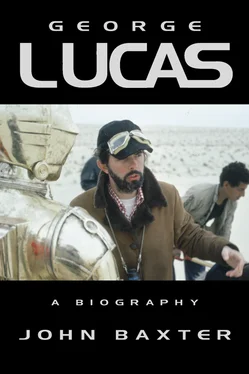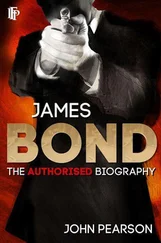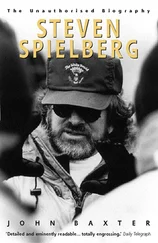For the soundtrack of THX , Murch created, in his phrase, ‘a Dagwood sandwich of sound and music, with no clear split between them.’ Recorded music was slowed down, speeded up, played backward, mixed with natural sounds or those of machines. For the prison scenes, he used the bass note of a large room humming with machinery.
The credits of THX1138 ascend the screen, suggesting a steady descent underground, an idea borrowed from an inter-title in Fritz Lang’s Metropolis . Before them, Lucas inserted one minute from a trailer for Flash Gordon Conquers the Universe (1940). Over scratchy, poorly-copied images of spaceships fizzing like firecrackers and a blond Buster Crabbe straight-arming aliens as if they’re the Notre Dame defensive line, the voice-over urges audiences to see how this American football hero copes with the threats of the twenty-fifth century – an implied comment that the future might be very different from the one imagined by Hollywood.
Lucas, probably coaxed by Murch, later justified the elaboration of THX1138 by calling it ‘a Cubist film – the story, the sound and the images were all views of the same thing simultaneously.’ He defended its didactic tone: ‘Everyone else calls it science fiction,’ he said. ‘I call it documentary fantasy. The film is the way I see LA right now; maybe a slight exaggeration. Duvall comes off drugs and discovers he’s been living in a cage all his life with the door open. It’s the idea that we are all living in cages and the doors are wide open and all we have to do is walk out.’
Marcia for one didn’t buy these justifications. She found the film cold, humorless, and arrogant – a summary of the negative elements of Lucas’s character. Coppola agreed. He would later tell Lucas to ‘write something out of his own life; something with warmth and humor that people can relate to.’ Even Lucas got the message. When he shot a few pick-up scenes in a Los Angeles studio and Willard Huyck and Gloria Katz came to watch, he told them, ‘I have an idea I’d love you guys to do. It’s a rock’n’roll movie and it takes place in the fifties and it’s about music and cruising and deejays.’ He sent them his notes, and over the next month they worked up a five-page outline of what Lucas had first entitled ‘Another Quiet Night in Modesto,’ but now preferred to call American Graffiti .
Preoccupied with the slide of American Zoetrope into anarchy and bankruptcy, Coppola took only a fitful interest in the progress of Lucas’s film. The first time Marcia showed him a completed reel, he simply shook his head and murmured, ‘Strange. Strange.’ After that, he didn’t see any more until the whole film was edited.
He was more concerned about extracting a long-term commitment to Zoetrope and its program from Warners, which summoned him to a meeting of the studio management on 21 November 1969. Ever the showman, Coppola created a ‘black box’ for each executive containing the screenplays for all seven proposed films, bound in black with the emblem of American Zoetrope. These boxes in turn went into a crate, ominously coffin-like, which two men carted into the Warners office.
They carted it out almost as quickly. Warners wanted no part of the projects, or of Coppola. His frantic pitch, handing round cigars and assuring them that he and he alone had the secret of making successful films, only alarmed them more. Even before he had seen any of THX1138 , Frank Wells, head of business affairs, told Coppola they wouldn’t be putting up any more money, and they expected him to refund the $300,000 already spent. ‘Warner Brothers not only pulled the rug out from Francis,’ said Walter Murch grimly, ‘they tried to sell it back to him.’
There’s no message or long speech, but you know that, when the story ends, America underwent a drastic change. The early sixties were the end of an era. It hit us all very hard.
George Lucas
The impact on American Zoetrope of Warners’ rejection was immediate. The weekly screenings and Chinese buffets ceased. Nescafé replaced espresso. The mini-skirted secretaries evaporated. Just as rapidly, support for projects drained away. Humiliatingly, Coppola had to tell Orson Welles he couldn’t make the film they planned. Stanley Kubrick no longer returned his calls. Without being asked, people packed up their offices and left. When those who stayed, like John Korty, found their rent soaring from $200 a month to $1000, they departed too.
Paradoxically, once Coppola abandoned his ambitious production plans and slashed his overheads, American Zoetrope began to turn a small profit. Film-makers on location in the area hired its cutting rooms, equipment, and vehicles. An advertising division made TV commercials for cooking oil and instant paella, and another department, Tri-Media, produced educational films; but none of these enterprises showed enough profit to eat into the mountain of personal debt.
When Coppola did occasionally make one of his grand gestures, it had a rueful overtone. He held a reception to coincide with the 1970 San Francisco Film Festival, but when the Lucases received their lavish invitation, Coppola had attached a note: ‘This letter cost $3 to print, type and send to you.’ Such comments were motivated less from self-pity than an amused truculence, a gambler’s wonder at the ways of chance, but they exasperated the people who’d believed in him and his dream of San Francisco as a new movie capital. Lucas and Milius were particularly incensed, since in the break with Warners the studio kept the rights to Apocalypse Now .
Though more than inclined to bear grudges, Lucas didn’t immediately vent his frustrations on Coppola, whom he still regarded as a surrogate elder brother. San Francisco magazine published a full-page composite photographic portrait, one side Lucas, the other Coppola. The spectacles, the watchful eyes behind them, the pursed lips, the black beard, the open-necked shirt were identical.
To some extent, Lucas felt responsible for Coppola. ‘He was constantly jumping off cliffs,’ said Lucas, ‘and I was always shouting, “Don’t do it, you’ll get yourself killed!”’ John Milius too found Coppola even more operatic and admirable in defeat. He and Coppola agreed to give each other a gun when they directed their first movie: ‘Paper is not honorable,’ decreed Milius. ‘The exchange of weapons is honorable.’ They decided to do the same for Lucas after THX , and chose a .22 rifle at Abercrombie & Fitch. ‘Francis went to charge it,’ says Milius, ‘and of course they had cut him off. We went back to Zoetrope, and they were trying to turn the lights off, because he had no money. Francis said, “That doesn’t matter.” Nothing ever changed Francis. He was in debt. He had no money. He had all these people running around, all these hippies, working for him, and all of us, but he was chasing girls … Nothing slowed Francis down. It was no different than when he had money, except there was more of it.’
Lucas kept working on the script of American Graffiti , fumbling through different approaches and combinations of characters. Radio was at the heart of it: ‘Graffiti is an Italian word,’ he explained, ‘meaning a drawing or inscription on walls, glib, funny, immediate. Everybody has a different way of checking out a culture. Some look at clothing, others at cars. My way is to examine rock radio, which is an American graffiti.’ Occasionally he veered off into other aspects of radio, like the old suspense programs such as Inner Sanctum and I Love a Mystery he’d listened to as a boy. Lucas made notes for a possible mystery story set in a radio station. He called it ‘The Radioland Murders’.
Читать дальше












